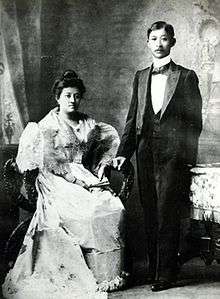José Alejandrino
José Cándido Alejandrino y Magdangal[1] (December 1, 1870 – June 1, 1951) was a Philippine Republican Army general during the Philippine Revolution and the Philippine-American War.
The Honorable José Alejandrino | |
|---|---|
 Alejandrino with his wife, 1901 | |
| Senator of the Philippines | |
| In office 1925–1928 | |
| Appointed by | Leonard Wood |
| Preceded by | Teofisto Guingona, Sr. |
| Succeeded by | Manuel Camus |
| Representative of Pampanga's Second District in the Constitutional Convention | |
| In office 1934–1934 | |
| Personal details | |
| Born | José Alejandrino December 1, 1870 Binondo, Manila, Captaincy General of the Philippines[1] |
| Died | June 1, 1951 (aged 80) Manila, Philippines |
| Political party | Nacionalista Party |
| Alma mater | University of Santo Tomas, University of Ghent |
| Profession | Chemical Engineer |
| Military service | |
| Allegiance | |
| Years of service | 1896–1901 |
| Rank | |
| Battles/wars | Philippine Revolution Philippine-American War |
He was also a senator of the Twelfth Senatorial District of the Philippines.[2]
Early life
Alejandrino was born to a wealthy family from Arayat, Pampanga, on 1 December 1870 in Manila. He initially studied at the Ateneo Municipal de Manila, and his contemporaries there included José Rizal, Juan Araneta, Cayetano Arellano, and Apolinario Mabini, among others. He acquired his Bachelor of Arts degree at the University of Santo Tomas, and pursued studies in Spain and at the University of Ghent, where he graduated with a degree in chemical engineering.[3]
Propaganda Movement
While in Spain, he was one of the members of the Propaganda Movement which demanded equality, especially equal opportunities in the colonial administration, for Spaniards and Filipinos. He was also a contributor to La solidaridad, an organization composed of Filipino liberals living abroad since 1872, mostly attending different universities across Europe. The group aimed to increase Spanish awareness of the needs of its colony, the Philippines, and to foster a closer relationship between the archipelago and Spain.[4] Alejandrino helped José Rizal in correcting errors in the El filibusterismo, which was published in Ghent, Belgium. He also helped distribute copies of the said manuscript.[3]
When Aguinaldo accepted the offer, Evangelista proceeded to Hong Kong, where he helped organise the Consejo Revolucionario along with Felipe Agoncillo, José Maria Basa and Mariano Ponce. Later, he became part of the group in the Hong Kong Committee, which included Agoncillo and Galicano Apacible, who was the head of La solidaridad, which advocated Philippines independence, as opposed to the circle led by Basa and Doroteo Cortes, who were for annexation by the United States. In February 1897, Alejandrino went to Japan in hopes of acquiring more weapons for the revolutionaries.[3] He was with Aguinaldo when the latter was exiled to Hong Kong in accordance to the Pact of Biak-na-Bato, which was signed on 14 December 1897.[5]
Philippine-American War and postwar life

In 1898 Alejandrino served in the Malolos Congress, becoming a member of the two committees that drafted the Malolos Constitution. On 26 September, he was given the post of Director of Agriculture, Industry and Commerce. Later, Aguinaldo designated Alejandrino Chief of the engineers of the Army, and he directed the building of trenches in several areas, including Bulacan and Caloocan.[3]
Alejandrino and his friend, General Antonio Luna, suggested to President Emilio Aguinaldo that they build a defensive line from Novaliches to Caloocan to delay the northward advance of American troops intent on capturing the railway. This was however not implemented, as General Luna was murdered by troops loyal to Aguinaldo. The president was later captured and unconditionally surrendered to General Frederick Funston on 29 April 1901.[6] On 12 April 1901, Alejandrino married Adela Chuidian, daughter of the reformist Telesforo Chuidian.[7] In August of the same year, Alejandrino accepted an offer to serve as the second city engineer of Manila.[6] In 1925, Governor-General Leonard Wood made him senator of the Twelfth Senatorial District of the Philippines. He died on June 1, 1951.[6]
Written works
- La Senda del Sacrificio (1949)[8]
Media portrayals
- Portrayed by Alvin Anson in the film, Heneral Luna (2015), and its sequel, Goyo: Ang Batang Heneral (2018).
References
- "Film # 007772461 Image Film # 007772461; ark:/61903/3:1:3Q9M-CSMF-G92L-2 — FamilySearch.org". Retrieved September 22, 2017.
- "List of Previous Senators". Senate of the Philippines. Archived from the original on April 23, 2007. Retrieved April 1, 2007.
- "José Alejandrino". Senate of the Philippines. Retrieved 22 May 2012.
- Dolan, Ronald E. (1991), "José Rizal and the Propaganda Movement", Philippines: A country study, Washington, D.C.: GPO for the Library of Congress
- Agoncillo 1990, p. 184
- "April 29, 1901: General Jose Alejandrino surrenders in Pampanga". Retrieved 4 September 2012.
- Pedrosa, Carmen. "Contribution of Chinese-Filipinos to the country". The Philippine Star. Archived from the original on 19 April 2017. Retrieved 19 April 2017.
- Ocampo, Ambeth R. (June 24, 2011). "Love in the time of revolution". Philippine Daily Inquirer. Retrieved May 25, 2012.
| Wikimedia Commons has media related to José Alejandrino. |